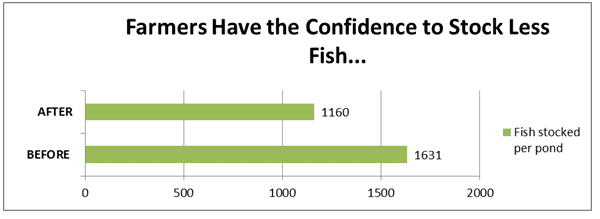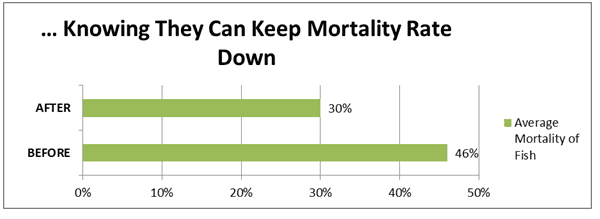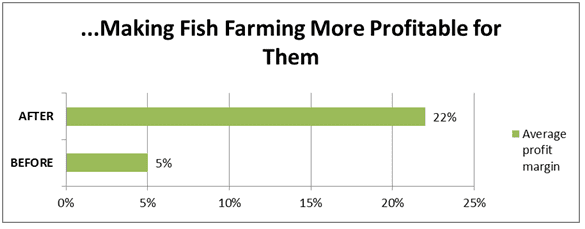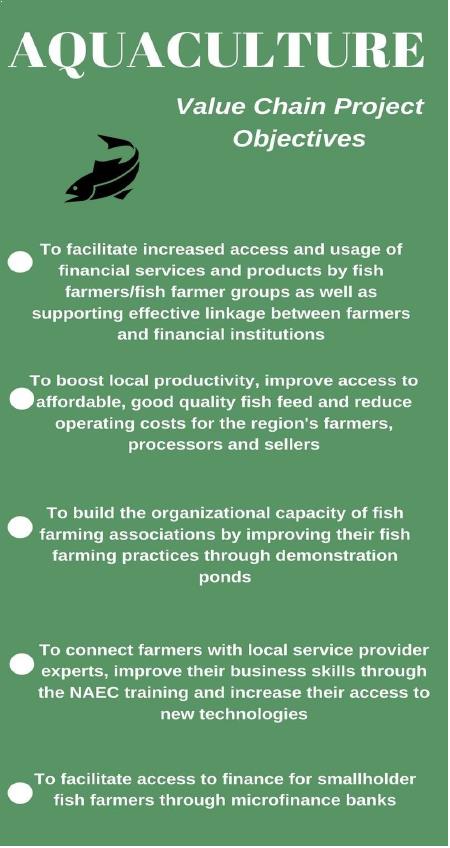The fisheries sector is one of the most important sectors in Nigeria, both from an economic and social standpoint. This sector supports about 7 million people (directly and indirectly) and contributes to the livelihood, employment, and household food security of Nigeria’s coastal communities, including the Niger Delta. In the Niger Delta, the fisheries sector is of utmost importance to particularly small-scale fish farmers which make up about 80% of the sector, supplying roughly 82% of the country’s domestic fish production. In spite of the large number of fish farmers available, the demand for fish far outweighs production and is far from being satisfied either through imports or domestic production.
This sector is plagued by a host of systemic constraints which impede market growth and affect the level of productivity and income of fish farmers. These constraints include:
- High cost of imported feed and insufficient supply of locally manufactured feed into the region
- Lack of quality, cost-effective, local fish feed and shortage of quality, fast-growing fingerlings and brood stock
- Poor infrastructural facilities within hatcheries and grow-out farms and poor knowledge of best practice in pond management which hampers productivity and profitability.
- Poor coordination between value chain actors and lack of access to new technology and markets.
- Inadequate and inaccessible Government extension service.
PIND initiated the Aquaculture Value Chain Project to address these constraints, stimulate considerable growth and improve the efficiency of the aquaculture sector.
DEMONSTRATION POND PILOT PROJECT (2012 – 2014)
We piloted a demonstration pond intervention to test out best practices in addressing the systemic issue of low productivity of catfish in partnership with United Ufuoma Fish Farmers Association (a fish farmers association), Grand Cereals Ltd and Rannan Feed fish (feed companies), and Brafin Nigeria Ltd (hatchery producer).
In this phase, we provided technical and enterprise development training to fish farmers in the pilot area on how to improve their selection of catfish species, prepare ponds, use fertilizers, feed, medicine, and water more effectively. After the training, a significant number of these farmers adopted improved practices including the proper use of quality feeds and fingerlings in their pond management. As a result, they were able to reduce their production cost and increase their yield, which enhanced their productivity and income. The pilot demonstration pond intervention proved to be very successful in increasing productivity while also increasing sales from the feed companies.
REACHING MORE FARMERS WITH THE DEMONSTRATION POND PRACTICES
Based on the success of the pilot phase, PIND conceptualized to reach more farmers in two phases: first phase within Delta State in 2014 and the second phase in other states of the Niger Delta in 2015. To reach more farmers with the demonstration pond’s best practices, we facilitated training for Aquaculture service providers including some feed company staff and government extension officers on technical and business training and demonstration pond management. Some of these trained service providers were thereafter linked with Fish feed companies who engaged them and provided the feed to run demonstration ponds in fish farm clusters while a few of the service providers went on to organize NAEC training paid for by fish farmers or development projects.
Over time, we were able to improve sustainability of the initiative by gradually reducing our involvement and financial contributions to allow market actors take the lead role. Four feed companies – Grand Cereals, Top feeds, Makarkute, and Aller Aqua – have successfully set up demonstrations at different locations across Delta state and Ondo state engaging the services of aquaculture service providers from the different fish farming associations trained by PIND. Other entrepreneurial service providers have also been able to organize demonstrations and NAEC training reaching a good number of farmers across Delta, Edo, Imo, Rivers, Bayelsa and Edo States.
INTRODUCTION OF THE CHORKOR OVEN
Smoked fish has fully developed as an alternative market to fresh fish. In the Niger Delta region, approximately 50,648kg of smoked catfish is consumed weekly either as smoked fish cuts or round fish and demand/consumption is expected to keep increasing as more people are becoming aware of this relatively cheaper source of protein. The Chorkor oven is a very cost effective and safe means of smoking fish. Through the use of the Chorkor oven, farmers are increasing the number of fish they smoke in lesser hours thereby improving their ability to meet the ever increasing demand for smoked fish in the region. The Chorkor oven is gradually proving to be an effective tool for fish smoking and a way of creating sustainable access to fish smoking service to fish farmers and increasing the shelve life of their fish. It is also a potential means of generating additional income and employment to farmers and fish processors, and a huge potential profit-making venture for interested investors.
KEY ACHIEVEMENTS
- Improved fish farming practices
The increased knowledge of best agronomy practices and the use of quality feed, fingerlings, and other production techniques has led to the significant improvement of fish farming within the region. According to periodic surveys done by our team to gauge the effectiveness of the demonstration pond projects, beneficiaries of the demonstration pond shared the knowledge they gained with an average of 10 persons each (within and outside the cluster) and at least 5 of these have adopted one or more of the modules. As a result, fish mortality rates have fallen and yields have increased.
- Improved relationships between fish feed companies and farmers
The demonstration pond project has been able to bring these most important value chain actors together in a mutually beneficial manner. Farmers have been able to benefit from the close relationship with the feed companies brokered by PIND with more affordable fish feed and training to improve their efficiency, while fish feed companies gained direct access to their target market and opportunities to increase their own sales.
- Increased Production/Profit
From a recent survey of farmers who participated in the demonstration pond projects, about 50% have increased their number of active ponds from 2 to 4, while most new farmers operate between 1 and 2 ponds. As a result of the improved practices adopted by farmers, we have witnessed 100% increase in production. Further, the average size of fish produced on the farm has increased from 0.8kg at baseline to 1.2kg thereby attracting a higher price as this is a market preference for consumers. The increase in production has therefore led to increased profit for fish farmers. Analyzed results from the demo pilot and phase 1 scale-up of demonstrations ponds intervention in Asaba show a combined income increase of up to N119,360,000 (One Hundred and Nineteen Million, Three Hundred and Sixty thousand Naira) to 520 direct and indirect beneficiary fish farmers. What a huge achievement in a short space of time!
“Between the first demonstration I did in 2014 and now, I’ve done five or six harvests and I’ve seen the impact of these better practices on my profit margin. I would say my profits increased by about 40%”.
Friday Diyen,
Chairman, Camp 74 Fish Farmers’ Union, Delta State
- Strengthening of Fish Farming Associations
Fish associations have witnessed a significant increase in the number of new members due to the high influx of new farmers to the sector. This increase has been attributed to the increased production experienced after the demonstration pond. The increased number of farmers has led to increased production of quality fish (which are bigger and able to survive for up to 8 days after sale) and increased daily average number of buyers (Fish mammies). New fish feed companies have also entered into the sector and are supplying quality feeds to farmers.
“Ever since we got ourselves in order, there is an influx of people. People are coming because word has gone out and people can see that a lot of good things are happening there, especially with all these trainings that we are having. The word is spreading without our knowledge, people are coming … they are rushing to come and join the association”.
Michael Uwehomobosa,
Chairman, Ugboroke Fish Farming Association
- Improved Access to Finance
Through our Access to Finance campaign, we were able to address inherent constraints regarding access to finance faced by fish farmers in the region. We conducted series of training on finance and financial management which have successfully changed the mindset of fish farmers and fish farmers’ associations and helped improve their capacity to meet the loan requirements of financial institutions. Microfinance banks have successfully disbursed loans of N12.6 Million to three fish farmers associations and these loans have been repaid. We crowded in a new MFB LAPO Microfinance bank which has successfully disbursed loans of over 80 Million Naira to fish farmers in Ughelli, Delta State. As at 2015, a total of 56.2 Million Naira has been lent to 141 farmers with farmers through our work, with loan repayment rates of almost 100%. We will continue working with financial institutions to ensure more sustainable lending to farmers to enable them grow their businesses.
“The first time of lending to UUFA was like tilling soil – hard work. The second time it was easier, we all have to learn. The vision is for us to have impact on the farmers, do business with farmers, and especially work with those who are serious about farm business”
LAPO Micro Finance Bank









I want pind to sponsor my fish Hatchery unit at Agbarha oto near Ughelli delta state
I want pind to assist me with consultative advice on my fish farm about how to make a big profit